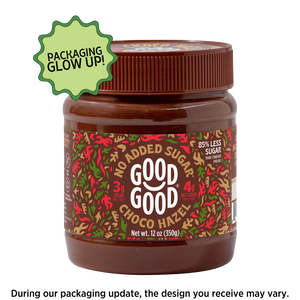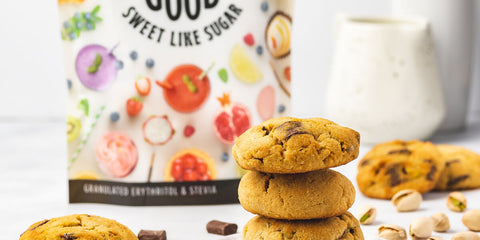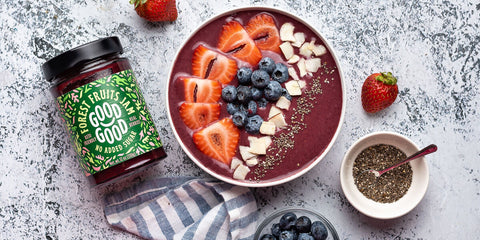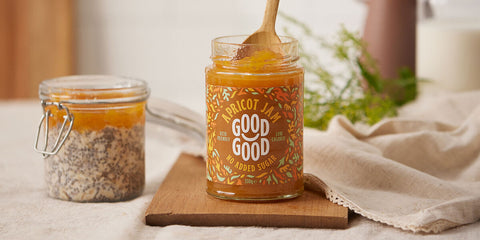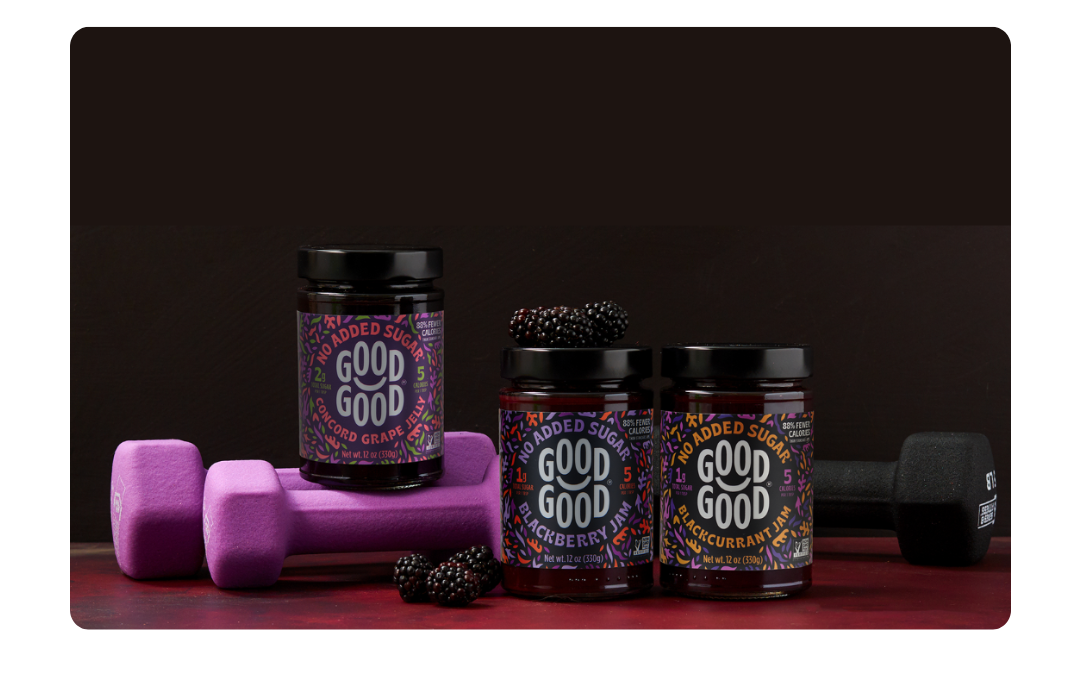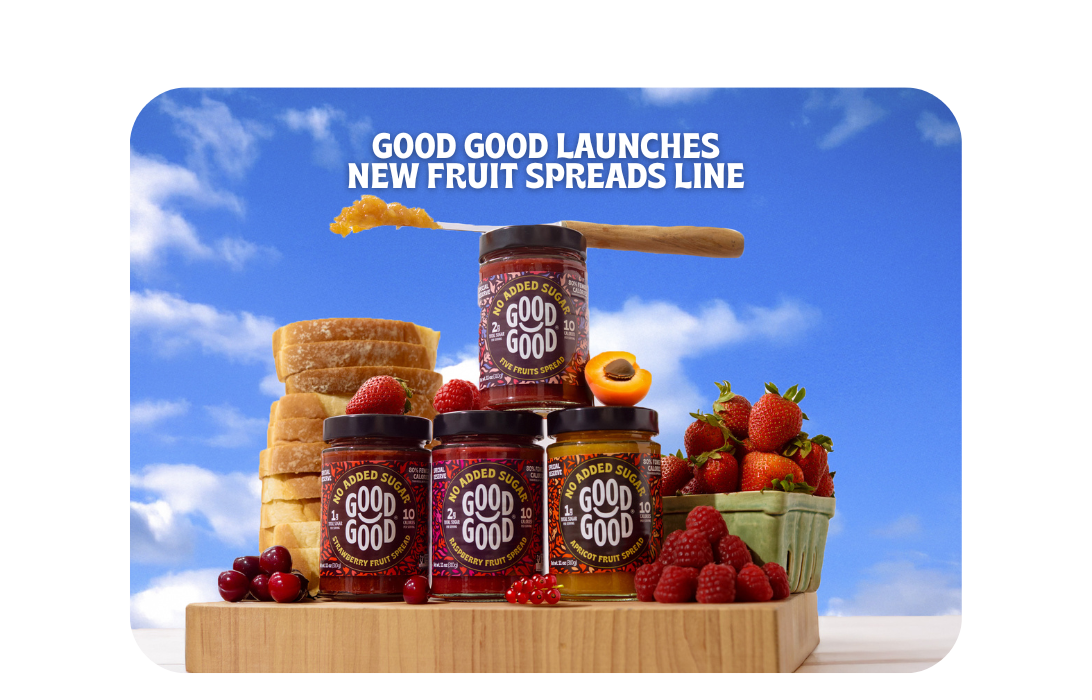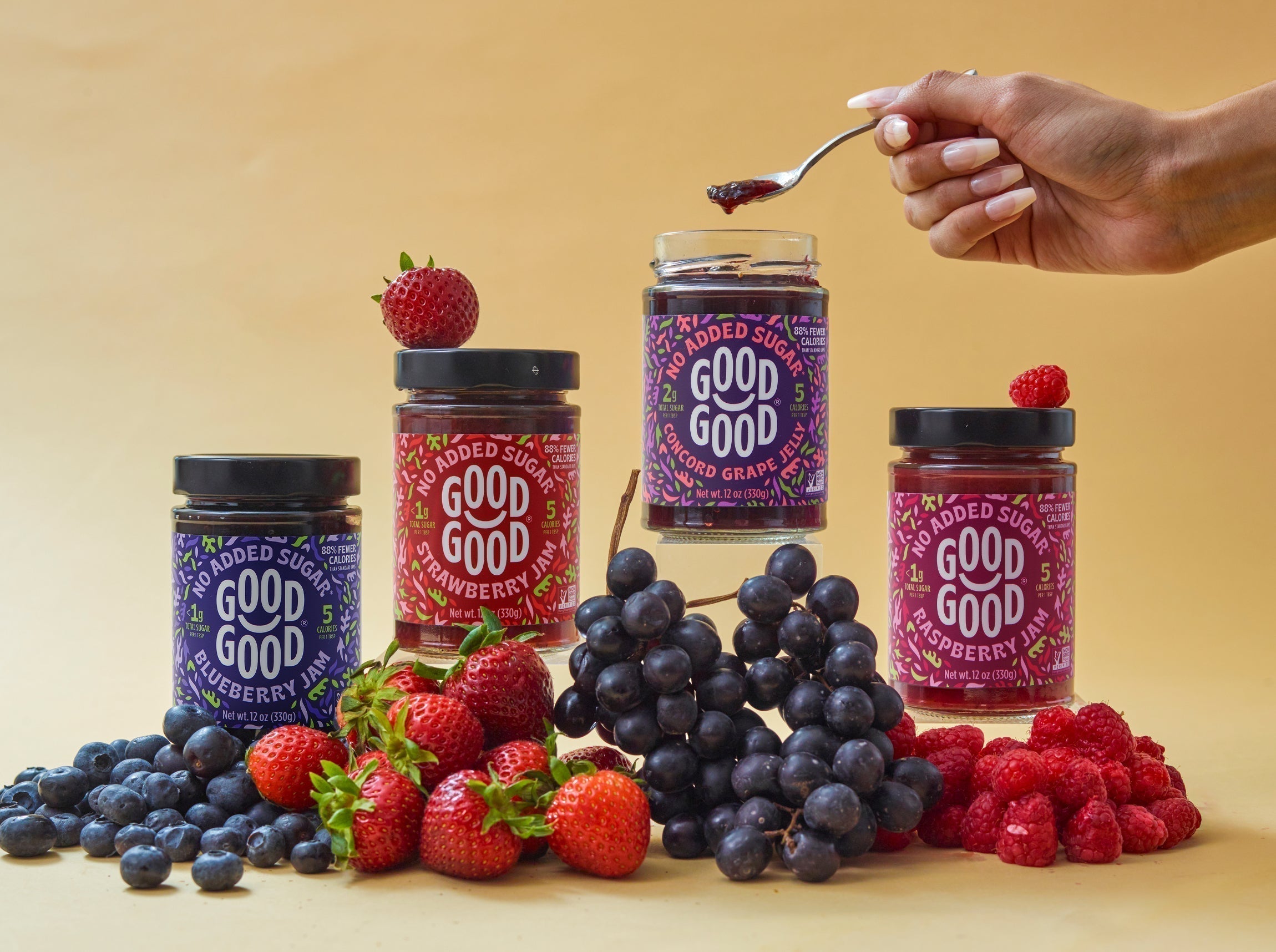In our quest for healthier living and dietary choices, many of us find ourselves in search of the best tasting sugar substitute.
At GOOD GOOD, we understand this quest well.
That's why we've developed sugar substitutes like our vanilla stevia drops and 99% sugar-free jelly range, designed to deliver the sweetness you love without the health drawbacks of processed sugar.
In this article, we'll explore our top picks for the best tasting sugar substitute that comes closest to mimicking the taste and feel of refined sugar.
Let’s get started!
What this article covers:
- Which Substitutes Tastes the Most Like Sugar?
- Best Tasting Sugar Alternatives
- What to Look for in a Sugar Alternative
- Best Tasting Sugar Substitute FAQ
Which Substitutes Tastes the Most Like Sugar?
When it comes to finding a sugar substitute that doesn't just promise sweetness but also delivers a taste and texture remarkably close to sugar we recommend the following healthier sugar substitutes:
- erythritol
- stevia
- allulose
- monk fruit
- xylitol
Our findings show that these five substitutes taste the most like processed sugar for several reasons.
Texture
When it comes to mimicking the texture of sugar, certain substitutes stand out:
- Erythritol: With its crystalline structure that closely resembles sugar, erythritol provides a satisfying crunch in baked goods like our famous keto berry crumble.
- Stevia: While it lacks the granular texture of refined sugar, stevia goes beyond sugar in sweetness and is excellent for liquid applications like our iced coffee recipe.
- Allulose: Offering a texture and taste very similar to sugar, allulose is a favorite for those seeking an ideal sugar substitute without the calories.
- Monk Fruit Sweetener: Often blended with erythritol, monk fruit delivers a sugar-like texture and sweetness, which makes it an excellent low carb sugar substitute for baking.
- Xylitol: Its granular form and sweetness closely mimics that of sugar, making xylitol a popular choice for a variety of uses.
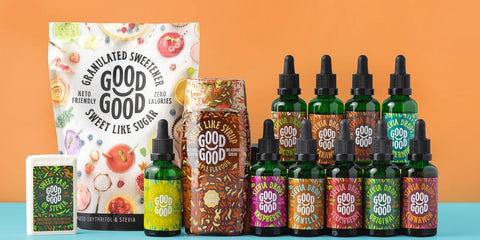
Health Benefits
These substitutes not only replicate the taste and texture of sugar but also offer significant health benefits, such as:
- lower calorie content
- minimal impact on blood sugar levels
- improved digestion
- strengthened immune systems
- promoting heart and dental health
Whether you're baking a batch of cookies, flavoring your morning coffee, or concocting a refreshing beverage, these sweeteners are ideal substitutes, ensuring you don't need processed sugar in your diet.
Our Sweet Like Sugar alternate sugars embody these health benefits, offering a guilt-free way to make every culinary experience a sweet one.
Best Tasting Sugar Alternatives
In the pursuit of healthier living and dietary choices, we at GOOD GOOD have always been at the forefront of innovation, offering products that satisfy your sweet tooth and contribute to your well-being.
Below, we present a comprehensive table of our favorite and tastiest sugar alternatives, ensuring you have all the information to make the sweetest, healthiest choice.
Table: Best Tasting Sugar Alternatives
|
Sugar Alternative |
What It Is |
Uses |
Benefits |
|
Stevia |
A natural sweetener derived from the leaves of the Stevia rebaudiana plant. |
beverages baking table-top sweetener |
zero calories doesn’t raise blood sugar levels |
|
Erythritol |
A sugar alcohol found in fruits and vegetables. |
baking cooking sugar substitute in beverages |
low calories doesn’t affect blood sugar or insulin levels good for dental health |
|
Allulose |
A monosaccharide or ‘rare sugar’ which is naturally present in small quantities of certain foods like wheat. |
cooking desserts sweetener in homemade jams and jellies beverages |
anti-inflammatory properties weight and diabetes management reduces risk of chronic disease |
|
Monk Fruit |
A small round fruit grown in Southeast Asia. |
sweetening beverages desserts natural sweetener in processed foods |
zero calories doesn’t raise blood sugar levels sweeter than processed sugar |
|
Raw Honey |
A natural sweetener produced by bees and derived from plant nectar. |
sweetening beverages baking cooking natural medicine |
contains antioxidants, vitamins, and minerals has antibacterial and anti-inflammatory properties |
|
Maple Syrup |
A natural sweetener made from the sap of maple trees. |
baking cooking sweetening beverages dessert and savory topping glaze |
contains antioxidants and minerals like manganese and zinc |
|
Saccharin |
One of the oldest artificial sweeteners. |
used in beverages and processed foods table-top sweetener |
zero calories doesn’t affect blood sugar levels suitable for diabetics |
|
Sucralose |
A no-calorie artificial sweetener made from sugar. |
baking cooking used in packaged foods and beverages |
doesn’t affect blood sugar levels suitable for diabetics heat stable for cooking and baking |
|
Xylitol |
A sugar alcohol derived from fruits, vegetables, and hardwoods. |
chewing gum baking sugar substitute in various foods ingredient in various cosmetic dentistry products |
low in calories reduces risk of tooth decay doesn’t affect blood sugar levels |
|
Yacon Syrup |
A natural sweetener extracted from the tuberous roots of the yacon plant which are native to South America. |
sweetening beverages and desserts used as a syrup. |
low in calories high in prebiotics aids in weight loss improves digestion |
|
Beet Sugar |
A type of sugar extracted from sugar beets. |
baking cooking sweetener |
similar to cane sugar but with a slightly different taste contains minerals and vitamins |
|
Lucuma Powder |
A natural sweetener made from the dried fruit of the Lucuma tree which is native to Peru. |
sweetening desserts and smoothies flavoring |
low in sugar contains antioxidants, fiber, vitamins, and minerals |
Stevia
Stevia stands out for its zero-calorie content and its ability to maintain stable blood sugar levels, making it an excellent choice for those managing diabetes or watching their calorie intake.
At GOOD GOOD, we harness the sweetness of stevia in our sweet leaf stevia drops, ensuring you enjoy natural sweetness without the usual health concerns associated with sugar.
Our investigation demonstrated that only 5-6 drops are needed to sweeten foods and drinks, giving you a delicious sugar replacement with a highly nutritious profile.
Erythritol
As a gluten-free sugar, erythritol is celebrated for its low-calorie profile and promoting overall tooth health.
After putting it to the test, we discovered that our Sweet Like Sugar sweetener is made using both erythritol and stevia. It’s an ideal sugar substitute that’s extremely versatile in baking and cooking endeavors.
We recommend that you use it when making our GOOD GOOD rainbow cookies and chocolate chip cookies with salted pistachios at home.
Allulose
Alluloseis hailed as one of the best tasting sugar substitutes due to its remarkable similarity to sugar in taste and texture.
Our findings show that allulose matches refined sugar’s sweetness by 70%. This makes it an ideal choice if you want a natural, low-calorie sugar alternative that’s versatile and flavorful.
Additionally, allulose has the added benefits of not affecting blood glucose levels, making it suitable for diabetics and those watching their sugar intake.
Monk Fruit
Monk fruit sweetener is a fantastic option for those seeking a natural, zero-calorie sweetener. Its sweetness comes without the calories or the blood sugar spikes, making it an excellent ingredient in beverages and desserts.
Raw Honey
Packed with antioxidants and possessing antibacterial properties, raw honey is a wholesome replacement for sugar. Through our practical knowledge, it brings a unique flavor and a host of health benefits to your table.
Maple Syrup
Maple syrup, with its rich flavor and antioxidant properties, offers a healthier way to sweeten your meals and beverages.
Our findings show that it’s more than just a sweet treat - it's also a natural source of vitamins and minerals such as calcium, potassium, and manganese.
Saccharin
As one of the oldest artificial sweeteners, saccharin provides a zero-calorie option for those looking to reduce their sugar intake without affecting blood sugar levels. It's also suitable for diabetics and those monitoring their calorie consumption.
Sucralose
As per our expertise, sucralose is a versatile sweetener that can withstand high temperatures, making it suitable for baking and cooking. It's a great choice for those seeking a no-calorie sweetener that doesn't impact their blood sugar or insulin levels.
Xylitol
Like erythritol, xylitol is favored for its dental benefits and low-calorie content. It's an excellent sugar substitute that can help reduce the risk of tooth decay and promote tooth remineralization while providing a sweet taste to your everyday meals and beverages.
Yacon Syrup
Yacon syrup is valued for its low glycemic index and prebiotic properties, supporting weight loss and digestive health. Based on our observations, it's a natural, nutritious way to sweeten your diet with minimal calories.
Beet Sugar
Beet sugar offers a slightly different taste from cane sugar but is similar in its uses and benefits. It provides minerals and vitamins, making it a slightly healthier replacement for regular sugar.
Lucuma Powder
Lucuma powder brings a unique, sweet taste to desserts, smoothies and even Acai bowls. Additionally, it’s low in sugar and carries a rich profile of antioxidants, fiber, vitamins, and minerals. It's an excellent choice for adding natural sweetness and nutritional value to your diet.
Alternatively, we recommend switching from lucuma powder to a natural sweetener like Sweet Like Sugar and Forest Fruits Jam from our 99% sugar free jelly range to make an Acai bowl right at home with its own unique flavor profile.
By incorporating these sugar substitutes into our products and beyond, we at GOOD GOOD ensure that you can enjoy the sweet moments in life without missing a beat.
What to Look for in a Sugar Alternative
When considering a sugar alternative, it's essential to focus on three critical aspects:
- flavor
- sweetness profile
- usage
Table: Essentials Of Sugar Alternatives
|
What To Look For |
Description |
Examples |
|
Flavor |
The taste of the sugar alternative is crucial. It should ideally have a clean, sweet flavor without any bitter or chemical aftertaste. |
Overall, allulose is the closest to processed sugar in both taste and texture while holding less calories. Erythritol has a taste very similar to sugar with no aftertaste but can create a cooling sensation in the mouth. Raw honey and maple syrup are often substituted for processed sugar in foods and drinks based on their flavors and ratios. |
|
Sweetness Profile |
This refers to how sweet the sugar substitute is compared to regular sugar. Some sweeteners are much sweeter than sugar, requiring adjustments in recipes. |
Monk fruit sweetener and stevia are much sweeter than sugar, often hundreds of times more so. This means you need less to achieve the same level of sweetness. Xylitol and erythritol have sweetness profiles closer to that of sugar, making them easier to substitute 1:1. |
|
Usage |
How the sugar alternative can be used in cooking, baking, or as a table-top sweetener. Some sweeteners may not hold up well to high temperatures or may not dissolve as well as refined sugar. |
Sucralose is heat stable and can be used in baking. Honey and maple syrup can add moisture to baked goods and are great for certain recipes but may alter the flavor profile. Erythritol is versatile and can be used in baking, cooking, and as a direct substitute for table sugar. |
Flavor
The flavor of a sugar replacement is paramount. It should complement your food and beverages rather than overpower them. Many sugar substitutes have distinct tastes that can alter the flavor profile of your dishes.
For instance, our Sweet Like Sugar sweetener and our 99% sugar free jelly collection, including our Apricot Jam and Raspberry Jam are designed to closely mimic the taste of refined sugar.
We carefully select our natural sweeteners to enhance your culinary creations, offering a taste experience that is both satisfying and health-conscious.
Sweetness Profile
The sweetness profile of a sugar alternative is another crucial consideration. Each sweetener has its own unique sweetness level, which can range from subte to intensely sweet.
Understanding the sweetness profile helps in adjusting recipes to achieve the desired taste without over-sweetening.
Products like our vanilla stevia drops, are formulated to offer a 1:1 sweetness ratio with sugar, making it easier for you to substitute sugar in recipes without having to guess the right amount.
This ensures that you can enjoy your favorite desserts, beverages, and meals with the perfect level of sweetness, just as you like them.
Usage
Finally, the usage of a sugar replacement is a vital factor to consider. Not all sweeteners are suitable for every type of cooking and baking.
Some sweeteners perform well in high-heat conditions, while others are best used in raw recipes or as tabletop sweeteners.
At GOOD GOOD, we understand the importance of versatility in cooking and baking. Our sweeteners and sweet leaf stevia drops are heat-stable, making it an excellent choice for baking, cooking, and even for sweetening hot beverages.
Similarly, 99% sugar free jelly like our Peach Jam and Fig Jam are perfect for spreading on toast, swirling into yogurt, or adding a sweet touch to your cheese boards, offering flexibility and convenience in your culinary endeavors.
By focusing on flavor, sweetness profile, and usage, our GOOD GOOD products not only meet your expectations, but exceed them, making every meal a delightful experience.
Best Tasting Sugar Substitute FAQ
Is Sugar Better Than Artificial Sweeteners?
Drawing from our experience, natural sweeteners are better than both refined sugar and artificial sweeteners.
While natural, refined sugar is still high in calories and can lead to weight gain, diabetes, and other health issues when consumed in excess.
Artificial sweeteners offer a low-calorie or calorie-free alternative, allowing individuals to enjoy sweetness without the associated health risks.
At GOOD GOOD, we focus on providing natural sweeteners that closely mimic the taste of processed sugar without the negative health impacts, offering a balanced approach to flavor and wellness.
Are Artificial Sweeteners Bad For You?
Based on our first-hand experience, most sweeteners, including our GOOD GOOD ones, are Generally Recognized As Safe (GRAS) by the FDA when used within recommended limits.
With that said, we always recommend opting for natural sweeteners ahead of artificial ones based on their overall safety, quality, and taste.
Conclusion
Throughout this article, we've explored the quest for the best tasting sugar substitute, highlighting the importance of flavor, sweetness profile, and usage in making the right choice.
At GOOD GOOD, we're dedicated to offering delicious, health-conscious alternatives to sugar like our stevia drops and 99% sugar free jelly collection.
So, what are you waiting for? Visit us at GOOD GOOD now and enjoy the sweet moments in life with our range of healthier sugar substitutes.
Did our blog meet your needs? You might also find our other guides helpful:
- Is Jelly Gluten Free?
- Is Jam Gluten Free?
- Is Orange Marmalade Gluten Free?
- Is Sugar Free Jelly Good for Diabetics?
- Is Sugar Free Jelly Good for You?
- Best Jelly for PB&J
- Best Grape Jelly
- Peanut Butter and Jelly Alternatives
- Red Currant Jelly Alternative
- Most Popular Jelly Flavor
- Best Grapes for Jelly
- Best Sugar Substitute
- Is Stevia Healthy?
- Is Stevia Good for Diabetics?
- Is Stevia Keto?





![[title] Reforestation Donation by Dollar Donation Club sold by US GOOD GOOD®](http://goodgoodbrand.com/cdn/shop/files/DollarDonationClubShopify_1_300x.jpg?v=1712681952)
